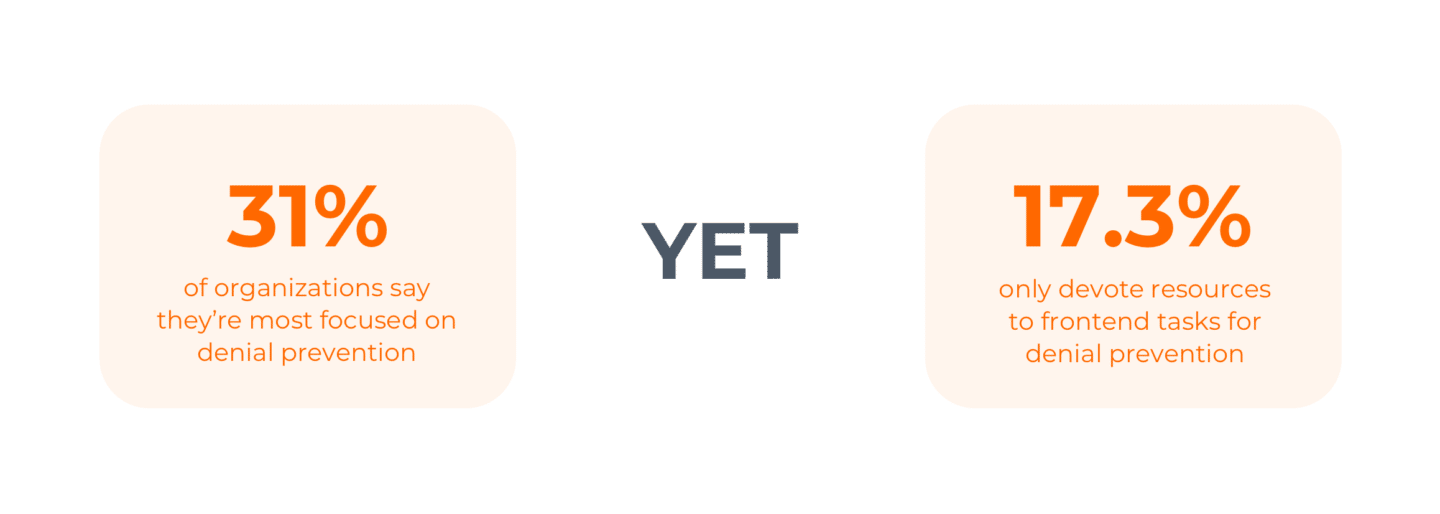Did you know unresolved claim denials can represent an average loss of up to 5% of net patient revenue for healthcare? Manual workflows and antiquated technology only contribute to this problem, causing denial management in healthcare to feel like a constantly moving target.
To dive deeper into denials and find the better way forward, Waystar and the Healthcare Financial Management Association recently surveyed healthcare financial professionals about denial management in healthcare and areas of opportunity.
Here’s what we learned — and how it can help you outsmart denials.
healthcare denial management takeaway
1. Perception versus reality
Determine where the bulk of your resources are actually going.
According to a recent HFMA survey, nearly a third of healthcare finance professionals say they’re most focused on denial prevention — but results show that’s not where most of their resources are being spent.
Most surveyed organizations are allocating more resources to backend healthcare denial management — after a denial has already occurred — focused on working denials and submitting appeals instead of frontend, proactive denial prevention efforts.
To truly stay ahead of healthcare denials, it’s important for organizations to not just work denials when they happen. The true key to success lies in creating a proactive strategy to prevent them before they occur, which shows a clear area of opportunity for healthcare organizations to improve denial processes. That way, your team can spend less time and resources working denials, while realizing more revenue.
Looking to create a proactive denial prevention plan? Watch our recent webinar Denial prevention 101: How to stop denials from the start.

healthcare denial management takeaway
2. Efficiency is everything
Arming your team with smart solutions is a gamechanger.
Nearly 30% of surveyed organizations say there is a significant need to improve the process of denial management in healthcare. Additionally, organizations that prioritized denial management were 77% more likely to cite a significant need for process improvement.
Addressing inefficiencies in healthcare denial management goes beyond improving your organization’s financial health. With health organizations facing unprecedented staffing challenges in recent years, having the proper technology for your team could be a key to staff retention, helping prevent the constant churn of employees.
Smart technology is crucial when it comes to driving operational efficiency and providing a better experience for staff members. Empowering your team with the right tools allows them to hone their knowledge and skills, while feeling more fulfilled in their work (and letting less revenue slip through the cracks).
Is the denials and appeals process impacting your team’s efficiency? Unpack the most time-consuming parts of the revenue cycle and cut wasted efforts.

healthcare denial management takeaway
3. Metrics matter
Metrics matter: Use data to dive into the root causes of denials + work smarter.
Determining where denials occur is a crucial step of mitigating risk and ensuring your revenue cycle is running efficiently. Digging into the root cause of denials helps your healthcare organization discover patterns of denials and stay ahead. Once you know your organization’s greatest challenges when it comes to healthcare denial management, you can make a proactive plan to address them.
Using data to get more information about your denials and pairing it with purpose-built technology can help your team better prioritize and triage denials. For example, our recent denials report shows more than 70% organizations surveyed have an established minimum balance write-off, which means that money is lost in many instances. Some are even missing the capability to filter for low-balance denials entirely.
However, if your team has the proper technology to pinpoint low-balance denials and work a bulk number with much greater speed and accuracy, it can payoff big in the long run — even if the denial amount appears to be a low value on the surface.
Are you ready to decrease denials with less manual work? Unlock the three critical steps of healthcare denial management today.

Want to take a deeper dive into research about denial management in healthcare?
Download the full report from Waystar and HFMA, plus get strategies to stay ahead of denials and real-world success stories.


